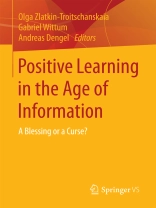While information and communication technology has a vast influence on our lives, little is understood about its effects on the way we learn. In the Age of Information, students – consciously or not – are learning in diverse formal and informal environments from a broad variety of sources, with scientific knowledge competing against unfounded assertions, and misinformation and biased data spreading through social and mass media. The Positive Learning in the Age of Information (PLATO) program illustrated by the contributions in this book unites outstanding and highly innovative expertise on the fundamentals of information processing and human learning to investigate a new paradigm of positive learning as a vital, morally and ethically oriented approach, which is of existential importance to maintaining the civilization standards of a modern society in the digital age.
Table des matières
Theoretical fundamentals of positive learning.- Learning as an interplay between neuronal, cognitive and information structures.- Learning as interaction and communication processes in formal and informal learning environments.- Learning with ethics and morality.- Learning with information and communication technology – impact and risk evaluation.
A propos de l’auteur
Prof. Dr. Olga Zlatkin-Troitschanskaia is Chair of Business and Economics Education at Johannes Gutenberg University Mainz, Germany.
Prof. Dr. Gabriel Wittum is Head of the Goethe Center for Scientific Computing (G-CSC) at Goethe University Frankfurt am Main, Germany.
Prof. Dr. Andreas Dengel is Chair of Knowledge-Based Systems at University of Kaiserslautern and Head of the Research Department Smart Data & Knowledge Services at the German Research Center for Artificial Intelligence (DFKI), Germany.












